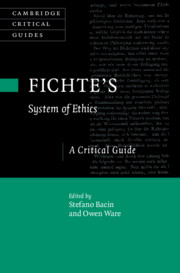Book contents
- Fichte’s System of Ethics
- Cambridge Critical Guides
- Fichte’s System of Ethics
- Copyright page
- Contents
- Contributors
- Acknowledgments
- Abbreviations and Translations
- Introduction
- Chapter 1 Fichte’s Ethics as Kantian Ethics
- Chapter 2 Fichte on Normativity in the Late Jena Period (1796–1799)
- Chapter 3 Fichte on Autonomy
- Chapter 4 Feeling, Drive, and the Lower Capacity of Desire
- Chapter 5 Fichte and the Path from “Formal” to “Material” Freedom
- Chapter 6 Fichte on the Content of Conscience
- Chapter 7 Fichte’s Theory of Moral Evil
- Chapter 8 Embodiment and Freedom
- Chapter 9 Ethics as Theory of Society
- Chapter 10 My Duties and the Morality of Others
- Bibliography
- Index
- Cambridge Critical Guides
Chapter 8 - Embodiment and Freedom
Fichte “On the Material of the Ethical Law”
Published online by Cambridge University Press: 20 May 2021
- Fichte’s System of Ethics
- Cambridge Critical Guides
- Fichte’s System of Ethics
- Copyright page
- Contents
- Contributors
- Acknowledgments
- Abbreviations and Translations
- Introduction
- Chapter 1 Fichte’s Ethics as Kantian Ethics
- Chapter 2 Fichte on Normativity in the Late Jena Period (1796–1799)
- Chapter 3 Fichte on Autonomy
- Chapter 4 Feeling, Drive, and the Lower Capacity of Desire
- Chapter 5 Fichte and the Path from “Formal” to “Material” Freedom
- Chapter 6 Fichte on the Content of Conscience
- Chapter 7 Fichte’s Theory of Moral Evil
- Chapter 8 Embodiment and Freedom
- Chapter 9 Ethics as Theory of Society
- Chapter 10 My Duties and the Morality of Others
- Bibliography
- Index
- Cambridge Critical Guides
Summary
This chapter is devoted to Fichte’s derivation of content for the moral law from his theory of the transcendental conditions of I-hood in Part III of the ”System of Ethics”. The chapter suggests that Fichte gives us a quasi-phenomenological account of how the I develops through system of drives in which nature and freedom are constitutively intertwined. In this framework, the chapter argues, embodiment plays a crucial role, because it is through the body that the natural drive address itself an agent, and for Fichte it is through the body that one exercises causality in the world. The chapter examines the details of this theory of embodiment by setting it in the larger context of Fichte’s confrontation with Kant’s formal idea of morality. The quasi-phenomenological set up of the argument is grounded in Fichte’s attempt to bridge the gap between the strict apriorism of the ethical law grounded in reason and the experiential dimension of the “original drive” as it is progressively and infinitely actualized in our life.
- Type
- Chapter
- Information
- Fichte's System of EthicsA Critical Guide, pp. 150 - 177Publisher: Cambridge University PressPrint publication year: 2021

